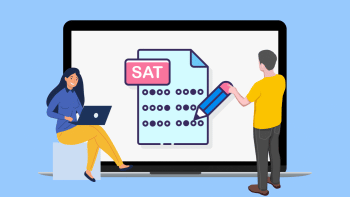Using computers as a medium of test taking: Is it a good idea?

Pen-and-paper examinations have been, throughout time, the most popular way of testing a student's proficiency. It may be argued that their continued usage today is a testament to their efficacy. After all, why fix something that isn't broken? The procedure is a simple but effective one. Yet, the traditional way, for all its merits, also has its flaws.
According to a study by H.K Lee, students with bad handwriting may find themselves disadvantaged in essay-based examinations due to the negative impression their work might have on the examiner. This issue was made more acute by research undertaken by Sülzenbrück, Hegele, Rinkenauer and Heuer, which suggests that extensive use of computers, as done by young people and children today, can impair fine motor skills such as handwriting. But perhaps the most crucial argument against handwritten examinations involves the environment.
In Bangladesh alone, millions of students at schools, coaching centres, colleges, and universities sit for various tests and examinations throughout the year. Copious amounts of paper are needed to satisfy this burgeoning demand. Trees, consequently, have to be cut. But as a country, we are at the forefront of the battle against climate change. So, can we really afford to be that wasteful?
The issues may be resolved by a switch to computer-based exams. They usually require a student to type their answers in a secure exam portal on a device provided by the institution. Once done, they could simply click "submit" to have their script collected and stored on the exam database. Adoption of such exams would result in a student's handwriting ceasing to be a significant factor and would also lead to a decrease in the demand for paper.
Many developed countries have made this switch in the past or are in the process of doing so. In US law schools, for instance, typed exams have been the norm for decades. Scandinavian countries have also been enthusiastic in adopting this mode of examination. Furthermore, the transition to computer-based exams was further accelerated by the COVID-19 pandemic, which saw schools and universities worldwide turn to various exam portals such as Exam.net and Inspera.
In the Bangladeshi context, however, very few exams take place in such a manner. Almost every school, college, and university conducts theory examinations on paper. Students of these institutions may only ever encounter typed exams if they choose to sit for IELTS or SAT examinations. There are, nonetheless, rare exceptions at the university level. For example, Bangladeshi students studying English law at the University of London must take their exams on laptops and PCs.
Jannatun Nisa Zarifa, a student of LCLS (South) who recently sat for her first-year examinations, describes that while she initially struggled to make the switch, having given exams traditionally all her life, she has grown increasingly comfortable with giving typed exams, to the point of finding them to be more convenient than handwritten exams.
She says, "There are quite a few reasons why I now find typed exams to be better than handwritten ones, the first being the obvious fact that it is much easier to be writing a greater number of words in a shorter amount of time. If I were to write an essay of around 1500 words by hand, it would take a big chunk of my day to be finished, while it takes less than an hour or so to do the same on a PC. Another reason is that correcting mistakes or erasing words is just a click away, which would be much more of a hassle had the exams been pen and paper based."
However, a powerful argument can be mounted that whatever the benefits of typed exams may be, they are only restricted to disciplines that are entirely essay-based, such as law. For a subject like mathematics or the natural sciences, where solutions have to be shown and diagrams made, it is unlikely that typed exams can provide an efficient alternative. This may be true for other subjects as well.
Md Abtahi Addin, who is majoring in Computer Science at BRAC University, is of the opinion that writing code by hand for exams helped strengthen the foundations of his programming skills and thus argues against the introduction of computer-based exams aside from lab work.
He says, "I learned small details that would have been left unnoticed had the exam been typed. This is because the software finds corrections for you. Writing codes by hand in a pressurised situation forces us to develop problem-solving skills, which is the most crucial skill for coding."
Yet, the most important arguments against typed exams in our institutions may be those of capability and privilege. Many, if not most, educational institutions lack both the technical and financial capacity to make such a transition. However, even for those institutions that can successfully make the leap, it would only widen the gulf between students of different socioeconomic backgrounds. Privileged students may have had the opportunity to develop their skills on a computer from an early age as opposed to those who did not have access to a computer.
From all of the above, we can thus conclude that while typed exams could indeed be the future as we chart the seas of a more environmentally conscious and technologically advanced world, there are still factors that hinder their total adoption. Even in countries with more developed infrastructures of education, the speed of progress has been tempered by caution. In the case of Bangladesh, at least for now, widespread adoption of typed exams may be no more than an intriguing matter to think about.

 For all latest news, follow The Daily Star's Google News channel.
For all latest news, follow The Daily Star's Google News channel. 









Comments